
Education has always meant waking up very early in the morning and rushing out of our homes with our lunch to catch the ‘almost missing’ school bus.
When we get to school, then we proceed to follow the planned day in class as dictated by the teacher. This has been a norm for generations.
What in the recent past has made us doubt its efficiency and look for more learning techniques?
One word – Evolution!
We are talking about globalization, growth in technology in the Internet of Things (IoT), the introduction of AI and MI in the workplace, the Modern Workplace Demand, and many others.
The conventional teaching approaches may have been effective in the past, but now, they are or rather, they do not equip children for life in this increasingly modern world.
Contents
- What is Online Education?
- What is Traditional Education?
- Online Education vs Traditional Education
- Advantages of Online Education
- Disadvantages of Online Education
- Advantages of Traditional Education
- Disadvantages of Traditional Education
- Traditional Schooling – The Pros, Cons and Ugly
- Is Online Schooling the Future of Education?
- Final Words
What is Online Education?
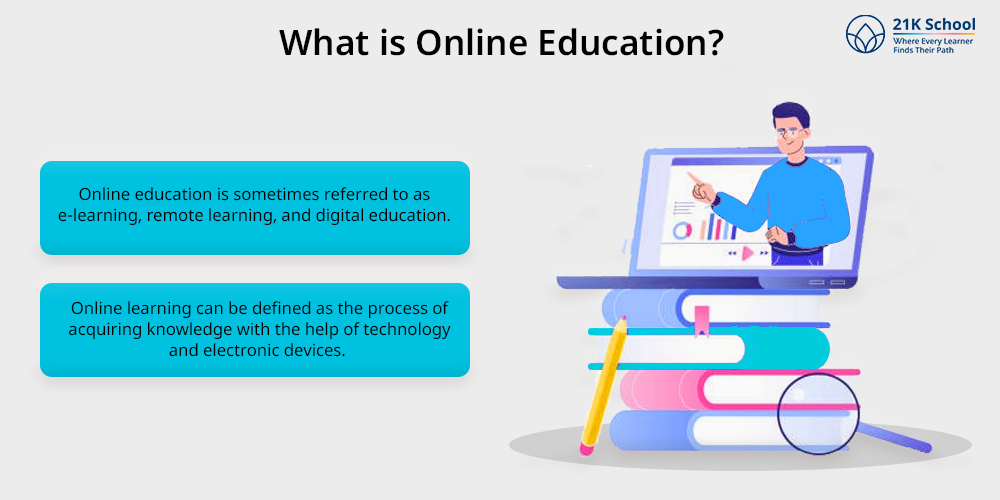
Online education is sometimes referred to as e-learning, remote learning, and digital education. Online learning can be defined as the process of acquiring knowledge with the help of technology and electronic devices.
Online learning can be acquired through mobile phones, laptops, computers, tablets, or any other medium of technology. Online education provides equal access to education to every individual, irrespective of their background and socioeconomic factors.
Online education provides easy availability of online education through the internet, which allows kids to connect anytime, anywhere. Various e-learning platforms provide courses and study sessions online to enhance the remote learning opportunities.
This allows kids to engage in active education, with the help of interactive sessions and by the implementation of new technical methods, like gamification, microlearning, mobile learning, simulations, and so on.
What is Traditional Education?
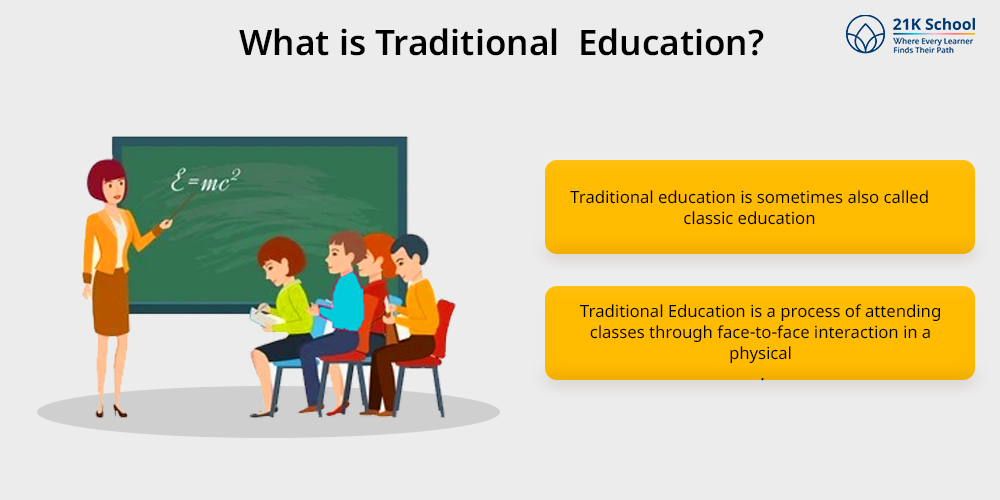
Traditional education is sometimes also called classic education. Traditional Education is a process of attending classes through face-to-face interaction in a physical mode.
Traditional education is a classic teaching method in which students learn from their teachers on a fixed curriculum with a fixed syllabus.
Traditional education offers interactive sessions with physical activities and extracurricular activities. This allows kids to engage in classroom sessions and allows them to develop connections with peers and professionals.
Online Education vs Traditional Education
Traditional education and online education have both merits and demerits; online education is flexible, whereas offline education provides face-to-face interaction. Each method of education is essential for holistic education.
Here is the detailed comparison between traditional learning and online learning.
| Aspects | Traditional Education | Online Education |
| Definition | Traditional education is a process of attending classes through face-to-face interaction in a physical mode. | Online education is defined as the process of acquiring knowledge with the help of technology and electronic devices. |
| Cost Effectiveness | Traditional education is a little bit expensive as it requires transportation, accommodations, extra fees, etc. However, Government schools are affordable compared to online schools. | Online education can be less expensive because it does not require physical resources, lodging or transportation expenses. |
| Flexibility | Traditional education offers a structured learning environment by adhering to a set schedule, place and classroom. | Online education allows students to study wherever and whenever they choose, which makes it ideal for people with hectic schedules. |
| Interaction | Traditional education promotes interpersonal relationships and prompt feedback by making it easier to communicate directly with teachers and peers. | Online education lacks face-to-face communication, which creates hindrances in the teaching-learning process. |
| Practical Exposure | Traditional education offers practical hands-on experience through physical activities and real-life learning. | Online education lacks hands-on experience, but it also provides practical experience through virtual labs, but it is less effective as compared to traditional ones. |
Advantages of Online Education
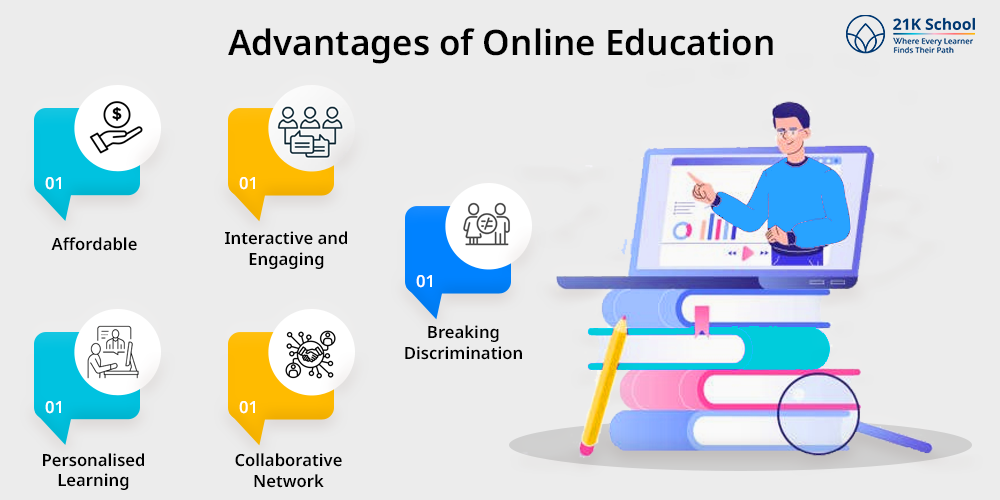
Online education has numerous advantages that allow kids to achieve learning outcomes to their full potential.
Online learning has the ability to address the challenges of traditional education and make education accessible to every student. Here you can check the advantages of online education mentioned below.
- Affordable: One of the major benefits of online education is it is affordable compared to traditional education. As online learning removes the expenses associated with students, meals, transportation, hostels, library etc.
Along with these, students also have to spend money on educational materials and resources, but in online education, every book, study materials, and resources are available in online mode, so students don’t need to pay any extra. - Interactive and Engaging: Online education is interactive and more effective. Online education uses various programs to enhance educational output, such as gamification, microlearning, AI, AR and VR and so on.
These enhance the concentration of students and make them more engaged in an online setting.
- Personalised Learning: Online education provides students with personalized learning , as every student has their own learning style and adaptability. It is essential to provide them with personalized and self-paced learning opportunities.
- Collaborative Network: One of the major advantages of online education is that it provides opportunities for teamwork and enhance collaborative learning
.
Through online learning, students can make proper connections with their peers and teachers. This also helps them in building a community that provides them with a future opportunity. - Breaking Discrimination: Online education helps in breaking old stereotypes, old stereotypes such as gender disparity, socioeconomic status, background, etc.
This creates hindrances in achieving . Through online learning, students can continue their studies without any fear of discrimination.
Disadvantages of Online Education
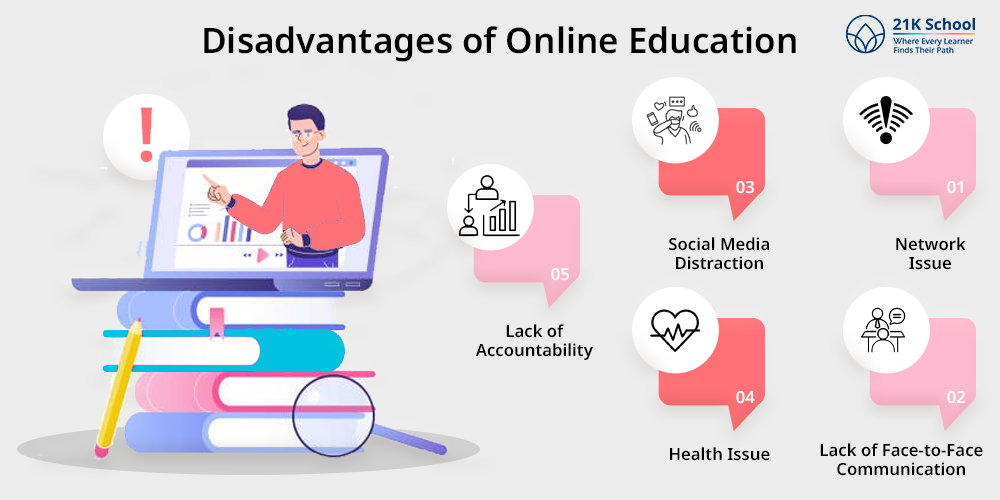
Online education is one of the effective ways of enhancing children’s educational interest and providing them equal learning opportunities.
However, along with the benefits of online learning , there are various disadvantages faced in online education. Here are the disadvantages of online education.
- Network Issue: One of the major disadvantages of online education is technical challenges, due to technical issues or internet challenges, students find it tough to connect with their teachers and attend online education.
Even due to the malfunction of computers or a technical glitch, lead to disruption in online learning. - Lack of Face-to-Face Communication: One of the major disadvantages of online learning is social isolation; attending online classes leads to social isolation among students. As in online education, there is very little chance of face-to-face communication, which creates hindrances in the teaching-learning process.
- Social Media Distraction: Attending online classes makes students addicted towards social media. This leads to distraction among students, and they find it difficult to complete the education session.
Notifications and pop-ups from social media such as Facebook, Instagram, and Twitter cause them to be distracted, which leads to a hindrance in the teaching-learning process. - Health Issue: More screen time leads to deterioration in kids’ health. Screen time is one of the major issues in online learning, as it affects their eyes badly and creates strain. Students who spend a lot of time hunched over a screen may also experience physical issues and poor posture.
- Lack of Accountability: Online education has a huge problem with accountability, which leads to challenges among students and teachers. Lack of accountability in online learning hinders the process of credibility as well and makes things more complicated.
Advantages of Traditional Education
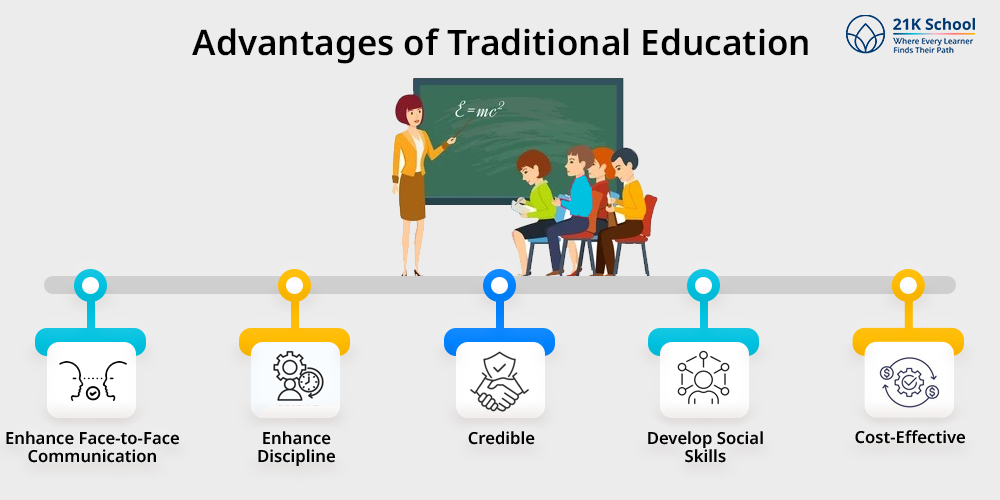
Traditional education is one of the most widely adopted educational methods. Traditional methods allow kids to attend physical classes with structured lessons that allow kids to complete their education.
Here are the advantages of traditional education mentioned below.
- Enhance Face-to-Face Communication: One of the major benefits of traditional education is it provides face-to-face interaction. Traditional classrooms allow kids to effectively communicate with others, and help in clearing doubts without any hindrances.
- Enhance Discipline: Traditional education teaches discipline , and the structure of the offline class helps students to enhance concentration level and determination towards a particular thing. This enhances their discipline and makes them more productive and confident.
- Credible: Traditional education is more credible and accountable, offline education uses a structured method of sharing information, which makes it reliable for everyone to have a proper understanding and knowledge. This reduces hindrances in educational contexts and makes it adaptable.
- Develop Social Skills: One of the major benefits of traditional education is it helps in building social skills. Through a regular mode of classes, students gain knowledge about how to interact with others, and it helps in communicating clearly and building social relations.
- Cost-Effective: Traditional education is cost-efficient, as compared to online schools. The fees of government schools and funded schools are comparatively lower than online schools.
Disadvantages of Traditional Education
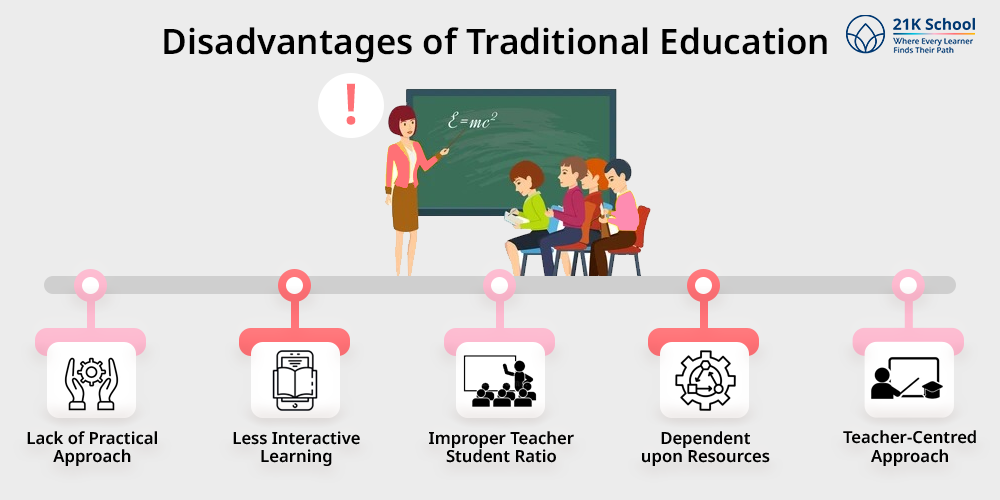
Traditional education provides better and credible learning opportunities, however, the regular mode of education has various disadvantages.
These disadvantages create hindrances in learning outcomes. Below you can check the disadvantages of traditional education.
- Lack of Practical Approach: One of the major disadvantages of traditional education is it focuses on theoretical learning and memorization of concepts.
Due to which students find it difficult to get practical experience. Due to memorization, kids find it tough to understand the underlying concepts.
- Less Interactive Learning: Traditional education is less interactive as they are centered between the teacher and students with the classic style of teaching.
Traditional learning is less engaging and children find it boring after a longer period of time. This hindered the cognitive development skills among kids.
- Improper Teacher Student Ratio: In traditional education, there is a huge gap in the teaching and learning process with an improper teacher-student ratio.
For eg. In a class of 30 students, there is only one teacher, or a combined class of 40 to 50 students with only one teacher. This improper ratio creates difficulty in understanding concepts more easily and clearing each student’s doubts. - Dependent upon Resources: Traditional education completely depends upon resources such as budgets, funds, physical resources, study materials, and so on.
Sometimes a lack of these resources creates hindrances in achieving full potential in education. Lack of Resources in offline education hindered the process of dynamic education. - Teacher-Centred Approach: Traditional education is all about the teacher-centric model in which knowledge primarily flows from the teacher to the students.
This method hinders peer-to-peer learning, a new initiative of the 21st century where one student passes their knowledge to another student.
Traditional Schooling – The Pros, Cons and Ugly
Traditional schooling format cover the aspects of predetermined syllabus, and timetable and are controlled by teachers only.
It has its advantages but also significant challenges and disadvantages. Let’s look at it in detail:
1. The Good
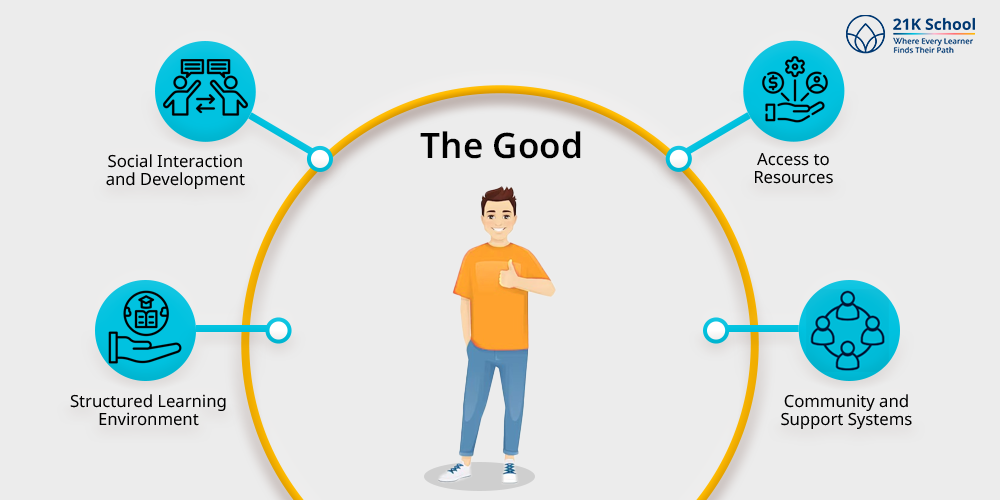
- Structured Learning Environment: They offer stability in daily schedules and particular curriculums so that the children can have a firm schedule to follow.
- Social Interaction and Development: Promotes friendly communication, cooperation, collaboration, and organisation of other activities not necessarily linked with academics.
- Access to Resources: Recommended for providing qualified teachers and other educational assets inclusive of libraries as well as laboratories.
- Community and Support Systems: Offers stakeholders opportunities to form support networks and contribute to community activities.
2. The Bad
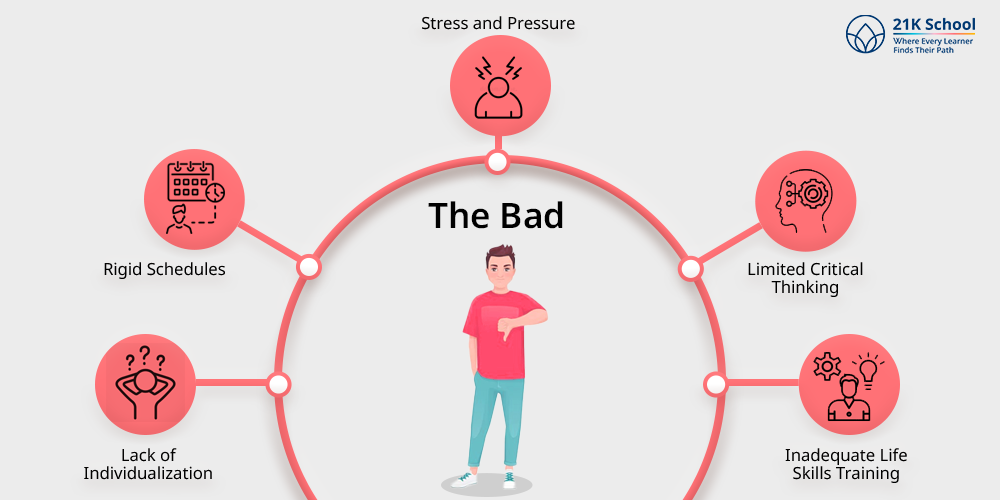
- Lack of Individualization: This could be attributed to the instance whereby learning styles and rates are applied and no consideration is made for them.
- Rigid Schedules: Specific, tangible, and tightly prescribed timeframes can be a problem in nurturing creativity and breakthroughs about yourself.
- Stress and Pressure: As with most things that revolve around evaluation, the early emphasis on grades as well as standardised performance tests puts a lot of pressure on the learners.
- Limited Critical Thinking: Teacher outputs can also be contrary to problem solving and analytical skills may not be encouraged, but students are forced to memorise.
- Inadequate Life Skills Training: Special attention to academic success may undermine such spheres of human activity as, for example, an ability to deal with practical problems and personal well-being.
3. The Ugly
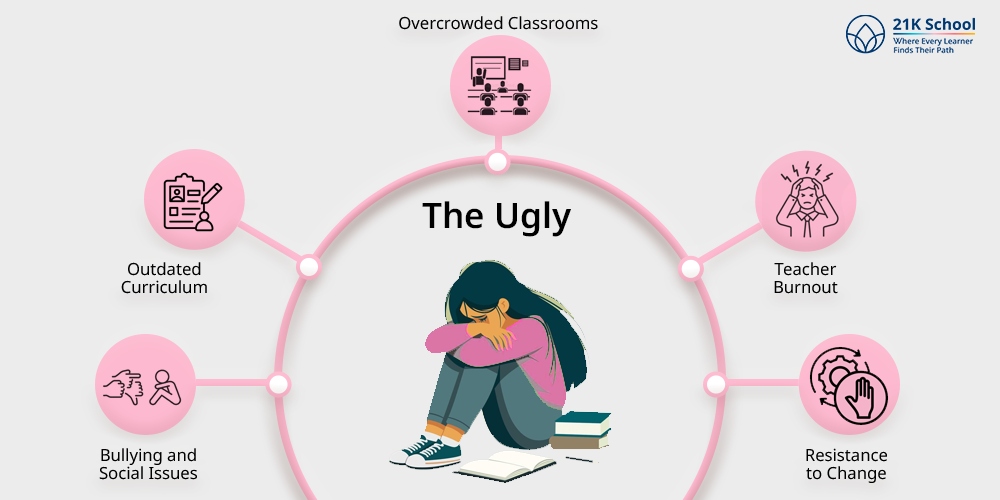
- Bullying and Social Issues: It is a known fact that schools can often become environments that cause bullying peer pressure and other social problems among students which are very unhealthy for their mental state.
- Outdated Curriculum: Problems can arise when curricula have not been designed to meet the fulfilment of modern requirements and technological revolution along it may increase the learners’ vulnerability with performing future tasks.
- Overcrowded Classrooms: The major disadvantage is that large numbers of students result in low student-teacher ratios which may mean that a student does not receive adequate one-on-one assistance as required.
- Teacher Burnout: Teachers experience burnout when working conditions are demanding and rewards lacking hence a decrease in the quality of education.
- Resistance to Change: They are sometimes rigid institutions that can slow reform and innovative teaching methods in the mainstream educational systems.
Is Online Schooling the Future of Education?
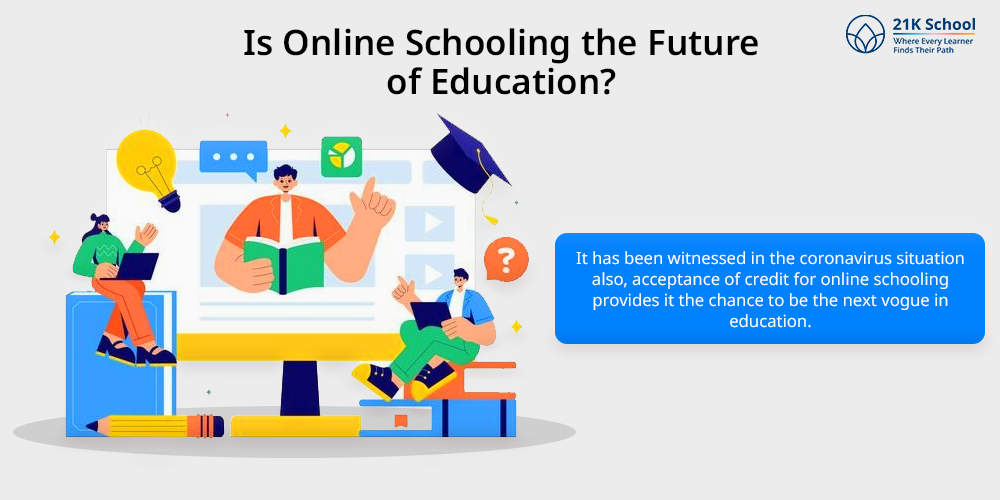
It has been witnessed in the coronavirus situation also, acceptance of credit for online schooling provides it the chance to be the next vogue in education.
Flexible schooling could be beneficial because one can study at any time and from any place which may be helpful for learners in rural areas, which might not offer a particular level of schooling.
On the broader level, it weaves flexibility in learning with quick responsiveness to the traits/expertise of the learners, using intelligent and learner-centered technology.
In addition, with the help of online platforms, the availability of a variety of courses is achieved with professors who have professional recognition; moreover, there are other benefits of online learning, like it is affordable because it does not use transportation and facilities costs.
Besides fulfilling the educational needs of the learners, online schooling also enables the learners to develop the necessary Dig help skills, basic to the facing technological world.
However, it is also necessary to underline that implementing this model, as it is described, it is necessary also to answer all these questions – the question of equity in resource distribution, the question of interest, the question of need, etc.
Final Words
Both traditional and online learning have special benefits and drawbacks that accommodate various learning methods and needs.
A larger audience can access online education because it offers flexibility, affordability and individualized learning experiences.
But it also comes with drawbacks like distractions, social isolation and technical difficulties.
However, traditional education can be constrained by a lack of practical application and resource limitations, even though it promotes social skills, discipline and face-to-face communication.
The decision between traditional and online learning ultimately comes down to personal circumstances, learning preferences and learning objectives, underscoring the significance of a well-rounded educational strategy that takes advantage of both approaches’ advantages.
